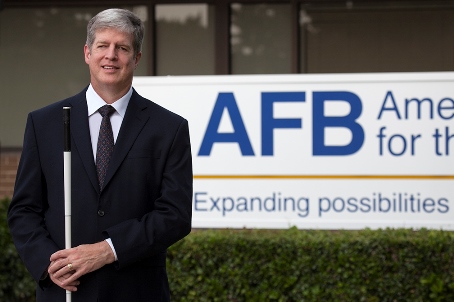AFB’s Communications team sat down with Kirk to ask him a few questions about his new role, his vision for the future, and his hobbies. Here’s what he had to say.
Tell us about your new role at AFB. What are you looking forward to?
I am honored to be the American Foundation for the Blind’s (AFB) new president and CEO. I’ve long admired AFB’s commitment to making the world a more equitable, inclusive place for people with vision loss. So I’m excited to build upon AFB’s impressive history and to work with the staff, board, and leadership in the field and individuals in the community to find ways to achieve our mission and vision.
How did you learn about AFB?
I’ve known about AFB for as long as I can remember. I’ve been blind since I was five and that was in the mid-’60s. AFB produced educational materials and devices that I used. And then professionally, I attended my first AFB Leadership Conference more than 15 years ago in DC. I remember being struck by the academic approach—evidence-based decision making, really understanding what the numbers say—that really appealed to me and I haven’t missed a leadership conference since then! About six years ago, I was asked to be on AFB’s program committee and was then invited to join the national Board of Trustees three years ago, so I’ve had an increasing involvement since the early 2000s.
What are you planning to tackle first?
Together with the AFB staff and board, I’m planning to take a careful look at the greatest barriers for people with vision loss and identify areas where we can have significant impact long term, and benefit the most people.This will mean working with education systems, policy makers, corporate leadership and technology leaders to create environments where people with vision loss have freedom of employment, freedom of information, access, communication, and freedom of movement through adequate transportation. I’m excited to roll up my sleeves and get started!
What’s the most critical issue for our field?
We have to move the needle on employment. More than 60 percent of blind individuals are not employed and more than three-fourths of individuals who are blind or visually impaired are not in the labor force. That has to change! Even in our own field, we have far too fewblind or visually impaired leaders at the top. There’s a great need for a focus on efforts to create not only qualified blind applicants for leadership positions, but also to work with organizations to be prepared to hire people who are blind. I’m thinking this might be a potential systems change role for AFB, to develop strategies around increasing the numbers of qualified blind leaders in cross sectors, including nonprofits, industry, education, and government. So, that’s really an exciting prospect
Besides employment, what are some other significant barriers?
For starters, I’d say access to information and communications. We must make sure people who are blind or visually impaired have the same access to the wonderful new technologies that are available to the population now. Access to transportation is also hugely important. And let’s not forget education. Right now, quality education is too hit or miss depending on which school a blind child happens to attend, so consistency in education is critical. Those are some of the things that come to mind—just a few!
Tell us a little bit about yourself and some of your interests.
I’m from Seattle, born and raised, so I’m a fan of the Mariners, the Seahawks, and the University of Washington Huskies. I love to cook and I’m an avid reader; I read fiction or poetry in braille daily. I’m also a music fan; I’ve gone to lots and lots of live music in my day and I’m looking forward to exploring the music scene in New York. And most importantly, I’m very close to my family. My wife, Ros, and I have been married for 31 years and our children, Tyler and Rachel, are grown up now. I really enjoy spending time with them, and interacting with them as adults; it’s pretty fun!
But I don’t actually have a lot of spare time these days and now I won’t have very much at all for a while moving forward because I really want to embrace this opportunity with AFB and learn all I can.
